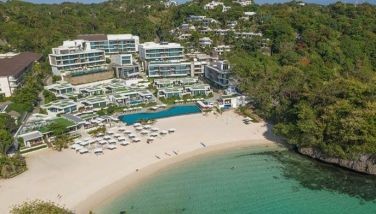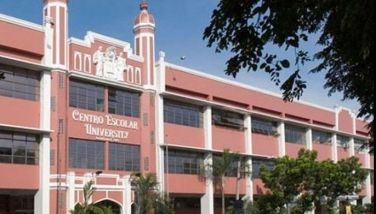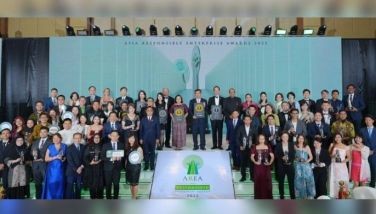ARMM mayors engage in infrastructure contest
MAGUINDANAO, Philippines — Mayors in Maguindanao are locked in a showdown, but this time without the deadly electoral and "rido" rhetoric their constituents are scared of.
Rido is a generic term for family feuds in most southern dialects, a major security constraint partly blamed for some of the socio-economic woes besetting remote towns in the Autonomous Region in Muslim Mindanao.
This time, mayors in Maguindanao and in other ARMM provinces—Lanao de Sur in mainland Mindanao, and the islands of Basilan, Sulu and Tawi-Tawi—are racing to become the most efficient in handling multimillion infrastructure projects.
"The intramural, if it is, is a friendly contest and the challenge is who can best implement ARMM's expensive projects in their respective municipalities," said engineer Nash Ebrahim, chief of Maguindanao's 1st District Engineering Office.
Ebrahim and Engineer Don Loong, who is regional secretary of ARMM's Department of Public Works and Highways, on Saturday found satisfactory the implementation of six costly "peace" road projects in six towns, implemented by local government units (LGUs) using funds allocated by Gov. Mujiv Hataman, chief executive of the autonomous region.
The concreting of the 6-kilometer Pinaring-Ibotegen-Panatan road (P70 million), the 4-kilometer Pinaring-Ibotegen road that connects to the Cotabato-Davao Highway (P30 million), both in Sultan Kudarat, the 6-kilometer Macabiso-Solon road in Sultan Mastura (P60 million), the 1,000-meter Aratuc-Ampuan road (P10 million) and the 5-kilometer Parang-Buldon road (P50 million), both in Buldon, and the 5-kilometer Buldon-Barira road (P50 million) in Barira, are being implemented by LGUs via special agreements with the Hataman administration.
The municipalities of Sultan Kudarat, Sultan Mastura, Buldon, Parang, and Barira, which are home to ARMM's historic Iranun people whose dialect is a mix of the Maguindanaon and Maranaw vernaculars. The areas are also known bastions of the Moro Islamic Liberation Front.
Accompanied by engineers, accountants and reporters, Ebrahim and Loong on Saturday assessed the road concreting works using manual devices, such as roller length counters and traditional measuring gadgets masons use.
He said the six projects were constructed according to specifications.
Their on-site findings were validated by Loong and reporters using drone aerial surveys and global satellite-aided geo-tagging systems.
Ebrahim and Loong both said it is the "maratabat," which means clan pride and honor, of the mayors in the six towns that motivated them to implement the projects religiously.
"This is an entirely new experience for them. They are being capacitated and honed in how to handle infrastructure projects with full autonomy," said Loong, whose office is functioning under Hataman's ministerial control.
Municipal engineers told reporters they were fascinated with the use of modern technology in inspecting how their respective LGUs are implementing the road projects.
"Honestly this is something so strange and new to us. This is something people on the ground cannot simply fool around with. Of course we will emerge proud and mighty because we are doing our homework well," said Edris Pangonutan, municipal engineer of Buldon
Iranun peasant Moktar Macaguiring, 49, said ARMM's road projects being implemented by LGUs in the six Maguindanao towns have ushered in initial improvements in their lives, made difficult by the absence of concrete roads needed to hasten their transport of farm products to markets in the municipal centers and in Cotabato City.
"Now there is this sort of a game where people in these towns compare the efficiency of their respective mayors in handling the projects funded by ARMM. There seems to be a contest, a friendly one, something good," Macaguiring said in Filipino, in heavy Iranun accent.
Just last Friday, Hataman and Loong crafted new memoranda of agreement in Cotabato City in the presence of journalists, entrusting a total of P124 million worth of projects to mayors of beneficiary towns in Maguindanao and Lanao del Sur.
The new road projects, the continuation of ARMM's existing arterial network thrusts in Maguindanao's Iranun areas, include the concreting of a 4-kilometer still rough portion of the Parang-Buldon road (P72 million) and the 2-kilometer Macabiso-Mamuken road in Sultan Mastura (P40 million).
Another agreement covered the concreting of the 1,000-meter Tubok municipal road in Tamparan town in the first district of Lanao del Sur (P12 million)
A 54-year-old farmer and grains trader, Macanacan Pontanan said he is excited with the concreting of the muddy stretches of the Parang-Buldon road in Barangay Mercedes in Buldon, where he operates a roadside mechanized corn shelling facility.
"Once concreted, our travel time to the markets where we sell our dried corn grains will be reduced by about two hours," he said in Filipino.
Hataman on Monday said another group of ARMM personnel, to be led by engineer Baintan Adil-Ampatuan, executive director of the Regional Planning and Development Office, will also initiate a validation of ongoing infrastructure projects in the autonomous region.
Ampatuan, a government career executive, said it is a big challenge for them to go around and inspect the infrastructure projects of the present administration.
- Latest
- Trending





























